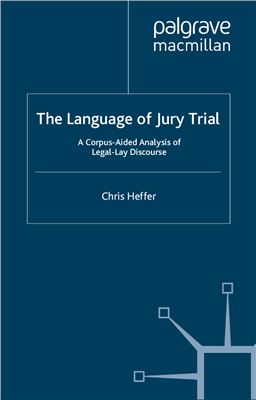Palgrave Macmillan, 2005.
253 p.
In an age of managerialism and professionalization, trial by jury might appear costly, inefficient and unprofessional, yet it is also one of the last democratic links between the legal system and ordinary people. Nowhere is that link more evident than in the language of lawyers and judges compelled to communicate their criminal cases or their legal instructions to lay juries. This is the first detailed analysis of the language of legal professionals in English jury trial, drawing on the largest and most representative corpus of official trial transcripts ever compiled. Chris Heffer analyses pattes of language use across hundreds of texts and develops a model of legal-lay communication based on strategic tension between narrative and scientific modes of reasoning. As well as providing descriptive and explanatory accounts of 'legal-lay discourse', the book makes a linguistic case for the survival of the lay jury against growing calls for professionalization.
253 p.
In an age of managerialism and professionalization, trial by jury might appear costly, inefficient and unprofessional, yet it is also one of the last democratic links between the legal system and ordinary people. Nowhere is that link more evident than in the language of lawyers and judges compelled to communicate their criminal cases or their legal instructions to lay juries. This is the first detailed analysis of the language of legal professionals in English jury trial, drawing on the largest and most representative corpus of official trial transcripts ever compiled. Chris Heffer analyses pattes of language use across hundreds of texts and develops a model of legal-lay communication based on strategic tension between narrative and scientific modes of reasoning. As well as providing descriptive and explanatory accounts of 'legal-lay discourse', the book makes a linguistic case for the survival of the lay jury against growing calls for professionalization.

